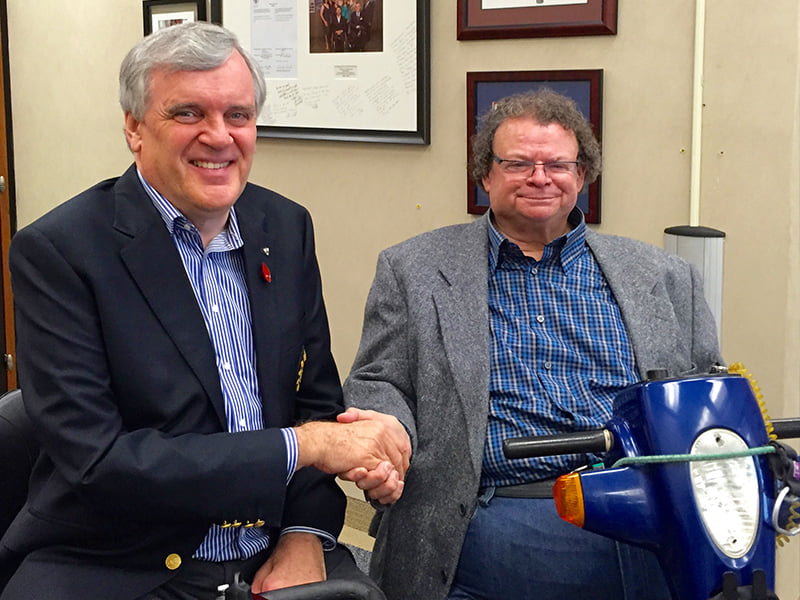Are you disabled? Do you struggle to fill your car’s tank with gas?
Now, there’s an app for that.
No more frantic searches for those few and far-between “full service” stations, as your gas gauge hits the red zone. No more honking your horn, hoping an attendant will help.
It’s been available in Canada for three years, but disability advocate Edward Rice is on a mission to spread the word about the “fuelService” app.
Rice, the longtime chair of the Canadians with Disabilities subcommittee of B’nai Brith Canada’s League for Human Rights, is touting the app as a game-changer for drivers with mobility issues.
“I’m thrilled with it,” said Rice, 72, a polio survivor who uses a three-wheeled mobility scooter to get around when he’s not driving.
Available for free from the App Store, fuelService allows disabled drivers to pre-arrange for gas station attendants to fill tanks at 1,300 participating Shell stations in Canada, and at some Chevron outlets in British Columbia.
Once installed, simply tap the recognizable yellow and red Shell icon, then hit “find stations.” Using GPS, it will list all nearby stations, with addresses, where someone can assist with a fill-up.
Then, choose a station. Within 30 seconds, the user will receive a response advising that if arrival is within 30 minutes, a staff member will assist. If on the rare occasion the station cannot help, the user simply goes to the next nearest station on the list.
On arrival, the user taps, “I have arrived.” A text will ask for the pump number and an attendant will appear to pump the gas and even inquire if anything is needed from the convenience store, if there is one. Payment is by credit card or through the app.
As Rice pointed out, the driver never has to leave the vehicle – a bonus for parents of children with a disability who cannot be left alone.
Those without a smart phone can call a toll-free phone number or visit www.fuelservice.org/ca.
Rice said he was looking for a solution to gas-filling problems for disabled drivers as far as back as 2013 while vacationing in the United States.
Laws there mandated that disabled people receive service at gas stations. “The trouble was, they never stipulated how they’re supposed to do it,” Rice recalled.
There were some solutions, like putting a phone number on the pump to call. But sometimes, the number faded, or wouldn’t work, or nobody answered the call.
Undeterred, Rice found a company in Chicago with a system called Fuel Call, consisting of a button to push on the pump, triggering a bell inside the station. “Sometimes the button didn’t work or no one heard the bell or they didn’t want to hear the bell,” he said.
He then spoke to executives of major oil companies like Esso, Shell, and Petro-Canada. They all agreed the issue was worthy, “but they didn’t want to put any money into it.”
But Petro-Canada called Rice before his interview to say someone had brought them an idea that guaranteed help for the disabled at a service station.
Rice made contact with the individual, a British computer programmer named Niall El-Assaad, whose spinal injury had left him a paraplegic. El-Assaad designed fuelService, and “I decided that was a better mousetrap,” said Rice.
“I asked about promoting it. The people who would benefit most from it don’t know about it.”
Shell in the United Kingdom went for the app and it’s now used at 3,000 of its stations there, with plans to expand to the European continent.
Rice estimates that so far this year, the app has been downloaded 42,000 times.
In 2017, Rice and fellow disability activist Louise Russo launched the Canadian Coalition for Mobility Challenged Drivers to assist motorists with disabilities and to promote the fuel app.
Rice has advised the Ontario government on disability issues, and worked closely with planners to ensure that people with disabilities would be accommodated at both the Sherman and Lebovic campuses of UJA Federation of Greater Toronto.
A few years ago, he helped design a ramp from the floor of the sanctuary at Beth Tikvah Synagogue, where he’s a member, to the bimah so disabled people can fully take part in services.
In 2020, he received the International President’s Award from B’nai Brith International for his advocacy work.
Rice still encounters inertia when it comes to removing obstacles for the disabled.
“Unless people are directly affected, or someone in their family is, they don’t consider a disability an issue to be dealt with,” he said.









